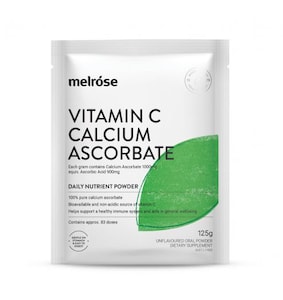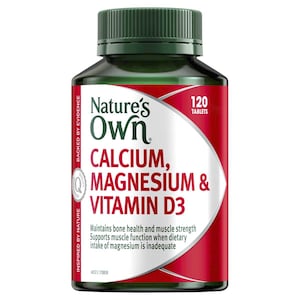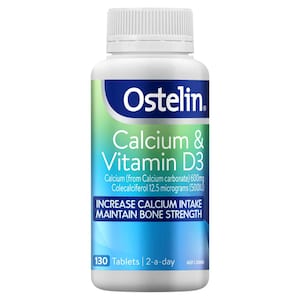Calcium Supplements (4)
Filters

Melrose Vitamin C Calcium Ascorbate 125g
View and Order

Ostelin Vitamin D & Calcium 60 Chewable Tablets
View and Order

Nature's Own Calcium Magnesium & Vitamin D3 120 Tablets
View and Order

Ostelin Vitamin D & Calcium 130 Tablets
View and Order
An essential guide to calcium supplements
What are calcium supplements?
Calcium supplements are formulations taken orally to increase dietary calcium intake. Available as tablets, chewables, liquids, gummies and powders, they are a popular option for people who need to boost their calcium intake but might not get enough from their diet alone.
Benefits of calcium supplements
You might know that calcium is a nutrient that helps us maintain strong bones and teeth, but did you know it also plays a role in other crucial body systems? Calcium aids muscle function, nerve transmission and hormonal secretion.
Maintaining adequate calcium intake is vital for overall health but is especially important as we age to reduce the risk of osteoporosis and other bone-related issues. Supplements can also support postmenopausal women by slowing the rate of bone density loss.
Choosing the right type of calcium supplement may benefit your wellbeing depending on your health status, age and dietary habits. Calcium carbonate is a cost-effective option and usually has a higher calcium content per tablet than calcium citrate, which may reduce the number of pills needed daily. However, it’s best absorbed when taken with food.
On the other hand, calcium citrate may be better absorbed on an empty or full stomach and is a preferable option for older adults, those with lower stomach acid levels or those who take acid-reducing heartburn medication.
When should you take calcium supplements?
The recommended dietary intake of calcium varies, though guidelines suggest around 1,300mg per day for women and 1,000mg per day for men.
Obtaining calcium from food sources that offer additional nutrients is generally more beneficial than relying on calcium supplements alone, though supplementation may be recommended if diet alone does not provide adequate calcium intake. Consuming a calcium-rich diet from milk and dairy products, fish with bones, leafy green vegetables, nuts, seeds, and soy products is the first step you can take to protect your overall health and wellbeing.
The National Institute of Health recommends dividing daily calcium intake into smaller doses of less than 500 mg each to optimise absorption and minimise side effects.
Do calcium supplements cause constipation?
While calcium supplements are beneficial, they may lead to gastrointestinal side effects, including constipation, in some people.
Need help navigating what to choose? Talk to a naturopath to learn more about our range.